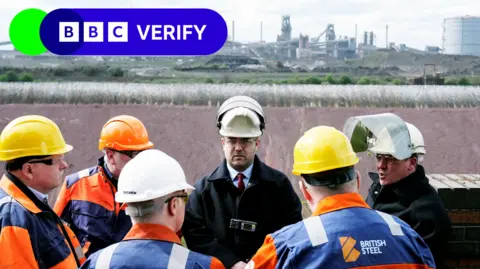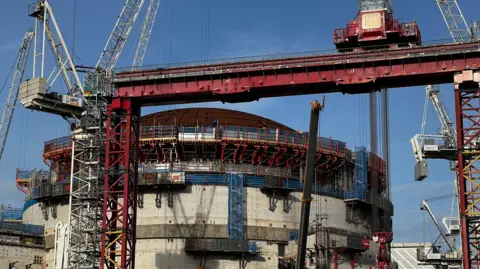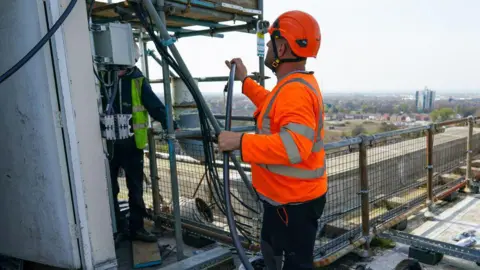BBC Verify
 Reuters
ReutersThe fate of the Scunthorpe steel works has shone a fresh spotlight on Chinese investment in the UK economy with critics raising questions over potential security risks.
The British Steel plant had been owned by China’s Jingye Steel.
But the UK government has now taken control of the Scunthorpe site, amid claims the Chinese owners were planning to permanently decommission its two blast furnaces and use its rolling mills to process imported Chinese-made metal instead.
BBC Verify looks at what we know about the extent of Chinese investment in the UK economy – and how much of a concern it should be.
How much Chinese investment is there in the UK in total?
Data from the Office for National Statistics suggests total Chinese investment in the UK in 2023 amounted to about £4.3bn – a small fraction of the total £2 trillion of overseas investment in the British economy in that year.
However, this is likely to be a considerable underrepresentation of the true scale of Chinese investment in the UK because the official data only includes the immediate investing country, not the ultimate source of the money – and because of a lack of transparency from Beijing when it comes to overseas ownership stakes.
Independent estimates from the American Enterprise Institute think tank, using corporate reports, suggest total public and private Chinese investment in the UK between 2005 and 2024 added up to $105bn, or £82bn.
This would have made Britain the third largest national destination of Chinese investment over this period, after only the US and Australia.
What have Chinese firms invested in?
There is a wide range of Chinese investment in the UK, ranging from critical energy and transport infrastructure, to stakes in private companies and football clubs.
Significant Chinese investments in UK infrastructure include a 10% stake in London’s Heathrow airport by the China Investment Corporation, a sovereign wealth fund wholly owned by the Chinese state.
The Hong Kong-based industrialist Li Ka-shing’s investment group owns UK Power Networks, which operates electricity distribution infrastructure across London, the South East of England and the East of England.
The billionaire’s group also owns a 75% stake in Northumbrian Water Group, which provides water supply and sewerage in the north east of England.
There is also a large Chinese investment in the Hinkley Point C nuclear power station in Somerset.
China General Nuclear Power Group originally had a 33.5% stake, with the rest owned by the French company EDF.
But EDF reports that the Chinese company has stopped contributing additional financing to the joint project – which has been running over budget – and, as a result the Chinese stake at the end of last year had declined to 27.4%.
The same Chinese company has an even larger stake – 66.5% – in the proposed Bradwell B nuclear site in Essex, according to the project website. EDF owns the rest.

Chinese companies have backed significant investments in the battery sector too.
The Minety battery site in Wiltshire is one of the largest energy storage projects in Europe. It was funded and constructed by Huaneng, a Chinese state-owned company which also operates the facility.
“The biggest growth of investment in Europe by Chinese firms is in EV [electric vehicle] batteries and much of this is private firms rather than Chinese state-owned firms,” says Professor Giles Mohan of the Open University.
The Hangzhou-based Chinese car company, Geely Auto, owns the Coventry-headquartered London EV Company, which manufactures electric black taxis.
The drive to achieve climate targets in the UK and Europe has welcomed Chinese investment in other green energy sectors like wind farms.
Red Rock Renewables, which is owned by the Chinese state-controlled SDIC Power, has a 25% share in the Beatrice offshore wind farm in Scotland.
As for investment in consumer brands, Li Ka-shing’s group owns the Suffolk-headquartered pub chain and brewery Greene King.
Wolverhampton Wanderers Football Club is owned by the Shanghai-based conglomerate Fosun.
While Jingye steel had total control of the Scunthorpe steel plant, it’s important to bear in mind that Chinese investors do not always have majority stakes in UK businesses, which would interfere with their ability to determine those companies’ operational decisions.
Some of these organisations such as airports and water utilities are also tightly regulated, potentially limiting the freedom of manoeuvre of their Chinese owners in controlling the assets.
Chinese investors are also estimated to have considerable holdings of UK land and buildings.
The Leadenhall Building, known as the “cheesegrater”, in the City of London was acquired by a Chinese property investor for £1.15bn in 2017.
How much of a threat could these investments pose?
The potential danger posed by Chinese investment in UK infrastructure has been extensively debated in recent years – and a particular flashpoint was the involvement of the Shenzhen-based Chinese technology company Huawei in building the UK’s 5G communications infrastructure.
Huawei was founded by Ren Zhengfei, a former Chinese army officer, in 1987.
The UK’s National Cyber Security Centre initially judged in 2019 that any risk posed by Huawei was manageable.
But the UK, nevertheless, required the Chinese company to begin pulling out of the UK’s telecoms infrastructure in 2020, after coming under pressure from the US government during Donald Trump’s first term as President.
The involvement of Huawei in UK networks was also opposed by a number of MPs.
 Getty Images
Getty ImagesGrace Theodoulou, policy fellow on China at the Council on Geostrategy, says there are two main potential threats to consider for Chinese investment in UK critical infrastructure.
“The first is the potential for espionage – for example, having Chinese-made audiovisual equipment installed in government buildings or devices.
“The second is the infrastructure can be controlled by the manufacturer and, as such, could be disrupted for geopolitical leverage,” she said.
Some analysts argue that Chinese law – which mandates all Chinese companies to align closely with Chinese Communist Party directives and to assist with national intelligence efforts – represents an inherent security risk in all Chinese investments in Western infrastructure.
“A likely scenario where it might be in China’s interests [to harm UK infrastructure] would be to impede Britain’s ability to impose sanctions against Beijing in the event of a Chinese invasion of Taiwan.
“If China were to invade Taiwan, and should they have control over parts of our critical infrastructure, it would highly impact the potential to enforce sanctions or similar measures,” Ms Theodoulou said.
However, other analysts are sceptical over whether it would be in the financial interest of Chinese investors to sabotage UK infrastructure or firms, as such actions would collapse the value of their investments and likely lead to their appropriation by the UK government.
“This threat is asserted and not proven, and these companies are profit-driven so it is not in their interests to sabotage our infrastructure,” said Prof Giles Mohan.
And they argue that a distinction should be drawn between Chinese investments in vital infrastructure and investments into UK firms which own consumer brands where the potential for public harm is considerably lower.




